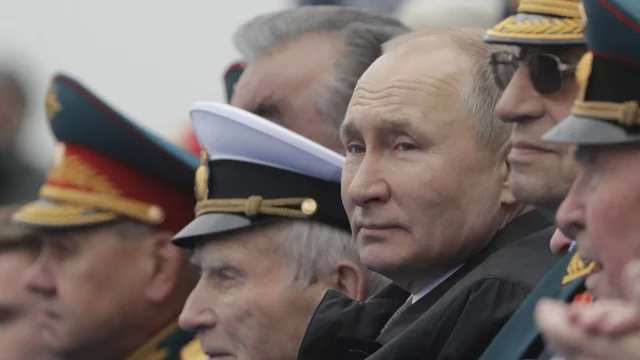Putin's abuse of history is straight out of the autocrat's playbook

In a recent debate with a friend, I expressed concern over the use of conjured history to comment on contemporary affairs. Then Vladimir Putin claimed that modern Ukraine was “entirely created by Russia,” thoroughly abusing history to justify his invasion of a sovereign nation.
I went back to Canadian historian Margaret MacMillan’s “Dangerous Games: The Uses and Abuses of History.” The book is replete with stories that created national myths, undeserving heroic figures and “bad and tendentious histories” to support current nationalistic or ideological biases — even invasions.
MacMillan
reserves her harshest judgment for “dictators who believe their own
lies.” They are able, as Putin has done, to amplify and reinforce those
lies with the megaphone of the state. In this age of social media, we
shall see how powerful that megaphone really is.
In the view of Harvard Professor of Ukrainian and Eastern European history, Serhii Plokhy, Putin leaped past the Bolshevik history of Russia and returned to Czarist imperial days to assert his country’s birthing of its neighbor as part of a larger Slavic nation.
In a fascinating interview in the New Yorker, Plokhy traces the contentious history of Russian attempts to suppress Ukrainian culture and to rationalize its diverse population by imposing the Russian language. The Soviet state then inflicted its totalitarian system on Ukraine making it even more difficult for Ukrainians to find _expression_ for their heritage.
In the early days of the current crisis, a respected colleague wrote in an email exchange that Ukraine was a “state,” not a “nation.” That was a cause for reflection. My friend wasn’t arguing that Ukraine had no claim to sovereignty. That was confirmed in a 1991 referendum. He seemed to be arguing that Ukraine had not yet earned the attributes of nationhood.
I responded that I thought that several democratic elections and two “color revolutions” to oppose corruption had earned the people of Ukraine the right to claim nationhood. Having visited the people-occupied Maidan (Kyiv’s main square) and seen the national pride expressed during elections, I believed that the state had indeed become a nation. Opposition to corruption had produced a strong semblance of unity, even across ethnic divides.
Until 2014, when Russia sent its “green men” into Crimea and started agitating for autonomy in the Donbas region, the Ukrainians lived peacefully with its Russian speakers, which comprise 17 percent of its population. Many ethnic Russians in places like Odessa self-identified as Ukrainian. They appreciated the relative freedom of the new post-Soviet Ukraine.
Two ethnic Russian-Ukrainians have served as president in the past decade. One was deposed because of corruption (and after rejecting a popular Ukraine-European Union Association agreement under pressure from Russia). The other is the current president.
Now President Volodymyr Zelensky, a Ukrainian-Russian Jew whose grandparents died in the Holocaust, is the leader of a government that Putin claims to be dominated by Nazis. Zelensky is expanding his popularity as he remains in the capital leading the resistance.
We don’t know how long the Ukrainian government can hold out against an all-out attack, but it seems to me that as time goes by the Putin propaganda — his abuses of history — will undercut his support at home. A large percentage of the Russian people are unlikely to accept Putin’s distortions, especially as they witness the slaughtering of Slavic relatives and begin to experience the economic pain that will result from his aggression.
One who has already spoken out is Ksenia Sobchak, the daughter of former St. Petersburg Mayor Anatoly Sobchak, Putin’s first post-KGB boss. She exclaimed, “There is no exit. We Russians will spend many years digging out from the consequences of this day.”
I met Sobchak’s father when he participated in the National Democratic Institute’s first project in post-Soviet Russia, a meeting of U.S. and Russian mayors. He was a rising star in the newly democratic Russia and one of the key drafters of the Russian Federation’s constitution. He was seen as likely to succeed Boris Yeltsin as president.
Putin sat behind Sobchak at that meeting, a slight, pale staffer looking after the man he thought would carry him and his KGB friends to power. Sobchak later turned against Putin, equating him with Stalin. He died in 2000 at the age of 62, many say in mysterious circumstances.
Sobchak didn’t live to replace Boris Yeltsin. Putin did. The rest, as they say, is history.
J. Brian Atwood is a visiting scholar at Brown University’s Watson Institute. He was the president of the National Democratic Institute from 1985 to 1993 and served as undersecretary of State and administrator of USAID in the Clinton administration.